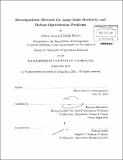Decomposition methods for large scale stochastic and robust optimization problems
Author(s)
Becker, Adrian Bernard Druke
DownloadFull printable version (7.065Mb)
Other Contributors
Massachusetts Institute of Technology. Operations Research Center.
Advisor
Dimitris Bertsimas.
Terms of use
Metadata
Show full item recordAbstract
We propose new decomposition methods for use on broad families of stochastic and robust optimization problems in order to yield tractable approaches for large-scale real world application. We introduce a new type of a Markov decision problem named the Generalized Rest less Bandits Problem that encompasses a broad generalization of the restless bandit problem. For this class of stochastic optimization problems, we develop a nested policy heuristic which iteratively solves a series of sub-problems operating on smaller bandit systems. We also develop linear-optimization based bounds for the Generalized Restless Bandit problem and demonstrate promising computational performance of the nested policy heuristic on a large-scale real world application of search term selection for sponsored search advertising. We further study the distributionally robust optimization problem with known mean, covariance and support. These optimization models are attractive in their real world applications as they require the model consumer to only rely on those statistics of uncertainty that are known with relative confidence rather than making arbitrary assumptions about the exact dynamics of the underlying distribution of uncertainty. Known to be AP - hard, current approaches invoke tractable but often weak relaxations for real-world applications. We develop a decomposition method for this family of problems which recursively derives sub-policies along projected dimensions of uncertainty and provides a sequence of bounds on the value of the derived policy. In the development of this method, we prove that non-convex quadratic optimization in n-dimensions over a box in two-dimensions is efficiently solvable. We also show that this same decomposition method yields a promising heuristic for the MAXCUT problem. We then provide promising computational results in the context of a real world fixed income portfolio optimization problem. The decomposition methods developed in this thesis recursively derive sub-policies on projected dimensions of the master problem. These sub-policies are optimal on relaxations which admit "tight" projections of the master problem; that is, the projection of the feasible region for the relaxation is equivalent to the projection of that of master problem along the dimensions of the sub-policy. Additionally, these decomposition strategies provide a hierarchical solution structure that aids in solving large-scale problems.
Description
Thesis (Ph. D.)--Massachusetts Institute of Technology, Sloan School of Management, Operations Research Center, 2011. Cataloged from PDF version of thesis. Includes bibliographical references (p. 107-112).
Date issued
2011Department
Massachusetts Institute of Technology. Operations Research Center; Sloan School of ManagementPublisher
Massachusetts Institute of Technology
Keywords
Operations Research Center.